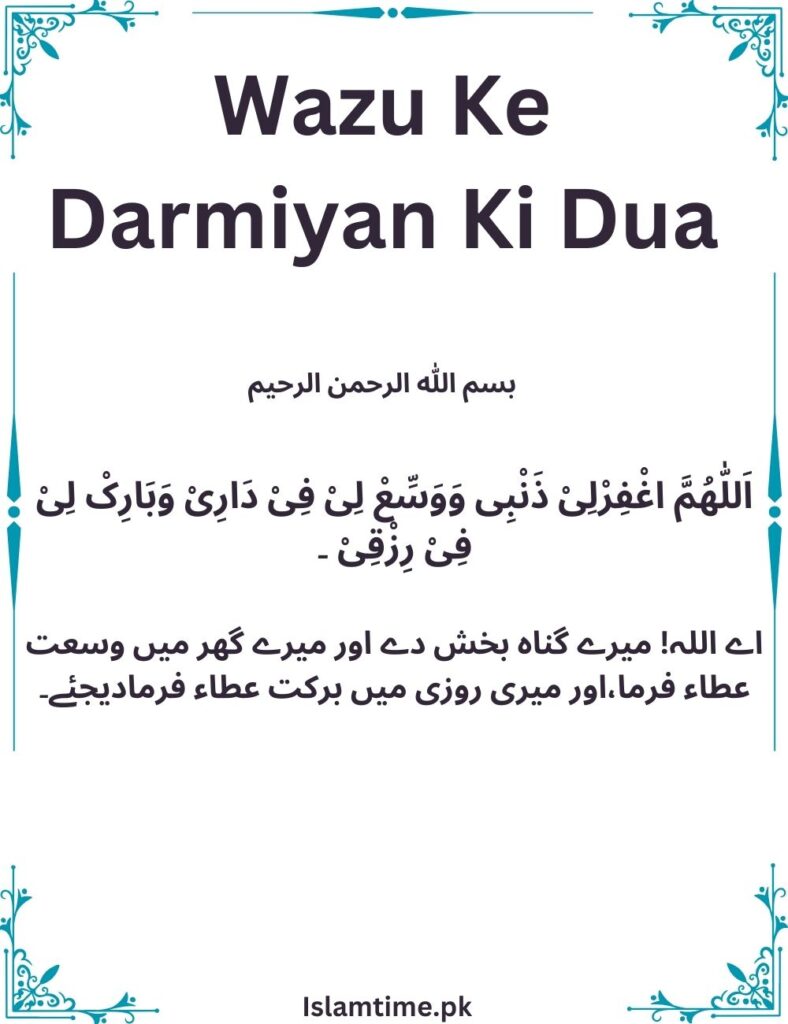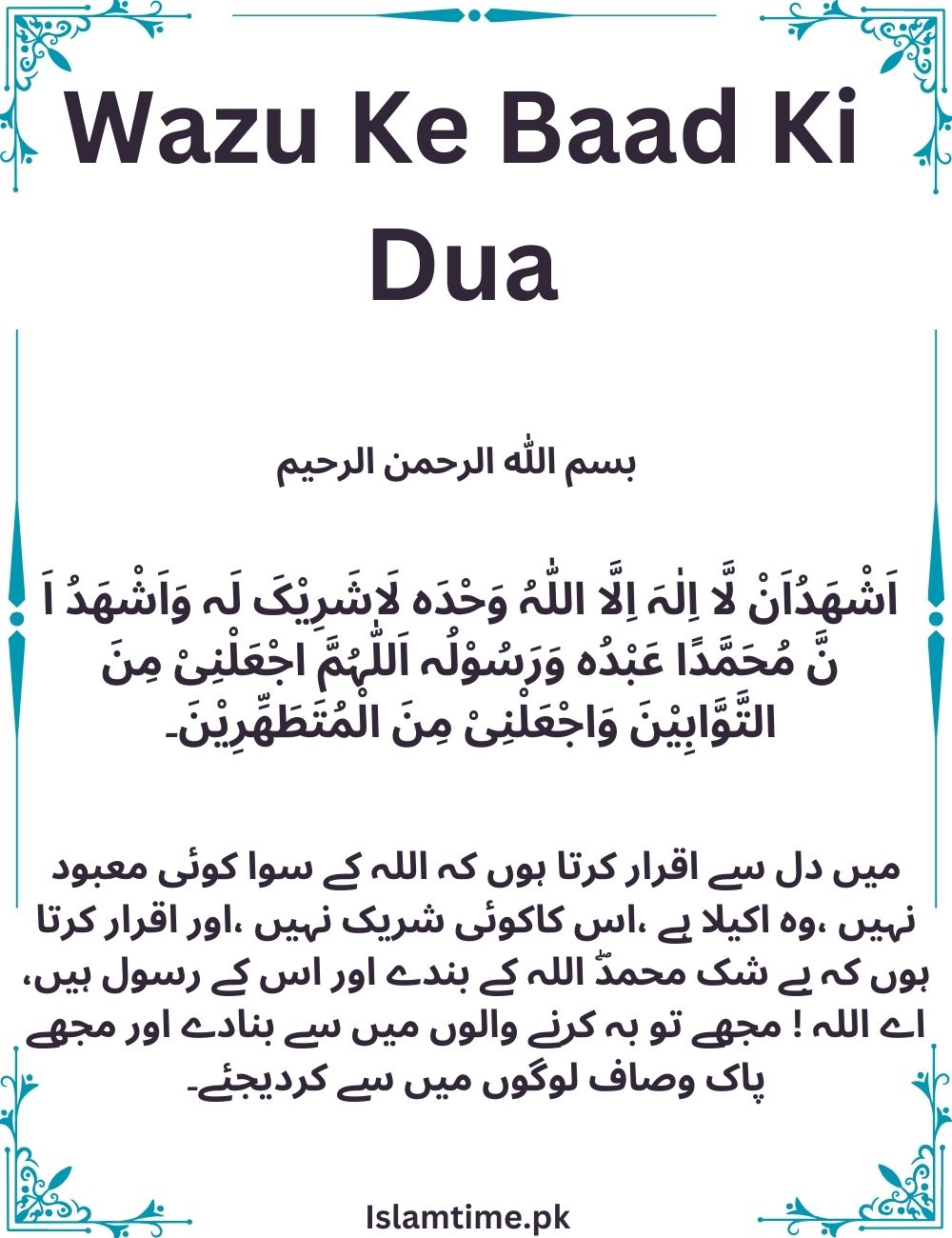Wazu Ka Tarika in Urdu (وضو کا طریقہ اردو میں)
Wudu (ablution) is a crucial ritual purification in Islam, required before performing Salah (prayer), handling the Quran, and other acts of worship. Wudu cleanses physical impurities and prepares a Muslim spiritually. Here is a comprehensive guide on how to perform Wudu (Wazu ka Tarika) properly:

Steps for Performing Wudu:
- Intention (Niyyah): Begin with the intention in your heart to perform Wudu for the sake of Allah and to purify yourself for prayer. This intention should be made internally and does not need to be verbalized.
- Saying “Bismillah”: Start by saying “Bismillah” (In the name of Allah).
- Washing Hands: Wash both hands up to the wrists three times, ensuring water reaches between the fingers.
- Rinsing the Mouth (Madmadah): Take water into your mouth using your right hand and rinse thoroughly three times.
- Rinsing the Nostrils (Istinshaq): Sniff water into your nostrils using your right hand and blow it out using your left hand three times.
- Washing the Face: Wash your entire face from the forehead to the chin and from ear to ear three times.
- Washing the Arms: Wash your right arm from the fingertips to the elbow three times, ensuring water reaches all parts, including between the fingers. Repeat with the left arm.
- Wiping the Head (Masah): Wet your hands and wipe over your entire head, starting from the front to the back and back to the front once.
- Wiping the Ears: With the same wet hands, wipe the inside and outside of both ears once.
- Washing the Feet: Wash your right foot from the toes to the ankle three times, ensuring water reaches between the toes. Repeat with the left foot.
Wazu Ke Darmiyan Ki Dua in Arabic, Urdu, and English (وضو کے درمیان کی دعا)

Wuzu, the act of ritual washing before prayers, is a cornerstone practice in Islam. It serves as both physical and spiritual purification. “Wazu ki dua” (supplication during ablution) is a powerful utterance that enhances this experience. Here’s a detailed exploration of these duas and their significance:
Wazu Ki Dua in Arabic
اَللّٰھُمَّ اغْفِرْلِیْ ذَنْبِی وَوَسِّعْ لِیْ فِیْ دَارِیْ وَبَارِکْ لِیْ فِیْ رِزْقِیْ ۔
Wazu Ki Dua in Urdu
اے اللہ! میرے گناہ بخش دے اور میرے گھر میں وسعت عطاء فرما،اور میری روزی میں برکت عطاء فرمادیجئے۔
Wazu Ki Dua in English
O Allah Azzawajal forgive me and give me abundance and blessing in my house and grant me abundance in my livlihood.
Reciting dua during wudu brings focus and mindfulness to each step of the ablution process. Duas act as an expression of gratitude to Allah (SWT) for the blessing of Islam and the opportunity to perform wudu. The act of supplication itself reinforces your faith and connection with Allah (SWT).
Wazu Ke Baad Ki Dua in Urdu, Arabic, and English (وضو کے بعد کی دعا)

Wudu, the ritual washing before prayer, cleanses not just the body but also the soul. Following wudu, a beautiful dua (supplication) called “wazu ke baad ki dua” is recited to further enrich this experience. Let’s delve into the details and significance of this dua.
Wazu Ke Baad Ki Dua in Arabic
اَشْھَدُاَنْ لَّا اِلٰہَ اِلَّا اللّٰہُ وَحْدَہ لَاشَرِیْکَ لَہ وَاَشْھَدُ اَ نَّ مُحَمَّدًا عَبْدُہ وَرَسُوْلُہ اَللّٰہُمَّ اجْعَلْنِیْ مِنَ التَّوَّابِیْنَ وَاجْعَلْنِیْ مِنَ الْمُتَطَھِّرِیْنَ۔
Wazu Ke Baad Ki Dua in Urdu
میں دل سے اقرار کرتا ہوں کہ اللہ کے سوا کوئی معبود نہیں ،وہ اکیلا ہے ،اس کاکوئی شریک نہیں ،اور اقرار کرتا ہوں کہ بے شک محمدۖ اللہ کے بندے اور اس کے رسول ہیں، اے اللہ ! مجھے تو بہ کرنے والوں میں سے بنادے اور مجھے پاک وصاف لوگوں میں سے کردیجئے۔
Wazu Ke Baad Ki Dua in English
I bear witness that none has the right to be worshipped but Allah alone, Who has no partner; and I bear witness that Muhammad is His slave and His Messenger. O Allah, make me among those who turn to You in repentance, and make me among those who are purified.
This dua expresses a desire for the company of righteous angels, seeking their protection and guidance. Recite the dua with a sincere heart, focusing on the meaning and internalizing its message. “Wazu ke baad ki dua” is more than just words. It’s a culmination of gratitude, seeking forgiveness, and aspiring for a righteous life. As you recite it, visualize the blessings of wudu, the importance of prayer and charity, and your commitment to following the path of Allah (SWT).
Benefits of Reciting these Duas (فضائل)
- Reciting duas during wudu brings mindfulness and focus to each step of the ablution process, transforming it from a routine task into a conscious act of worship.
- Specific duas during wudu acknowledge shortcomings and seek Allah’s (SWT) forgiveness, while also imploring blessings for a righteous life and a successful hereafter.
- Dua during wudu seek guidance from Allah (SWT) and protection from evil whispers and temptations.
- The dua implores Allah (SWT) to make one among the righteous servants who establish prayer, give charity, and adhere to His teachings.
- Reciting the dua after wudu reinforces one’s faith and commitment to following the path of Allah (SWT) and living a righteous life.
- Dua after wudu seek admission to Jannah (Paradise), the ultimate reward for a life of piety and devotion.
Conclusion
Incorporating “wazu ke darmiyan ki dua” and “wazu ke baad ki dua” into one’s daily routine can transform the simple act of wudu into a transformative spiritual practice, bringing about a deeper connection with Allah (SWT), a heightened sense of awareness, and a renewed commitment to living a righteous life.